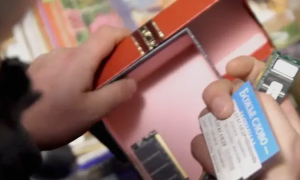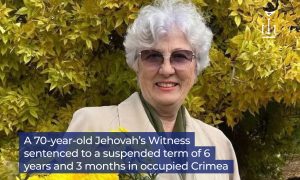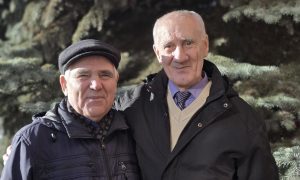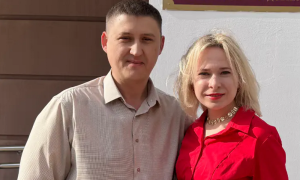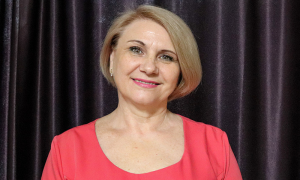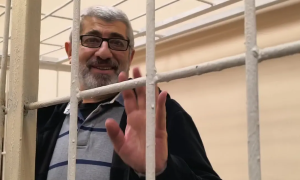The Supreme Court of Russia started hearings on the lawsuit on the liquidation of Jehovah’s Witnesses. A textual report is being conducted from the courtroom.
| 10:58 |
The large beautiful courtroom is crowded. There are more than 200 people, including numerous journalists, representatives of public organizations, foreign embassies. The hearing began at 10:30. A little less than 250 people remained on the street to wait for the results of the hearing. Povarskaya Street in Moscow is filled with cars with TV transmitting antennas. Many cameras are taking off. From the police radios, the messages “Everything is calm, without incident” are periodically heard. In the hall, representatives of embassies and foreign organizations in the headphones listen to the translation of the process. The case is heard by Judge Yu. Ivanenko. The party of the defendant, the “Administrative Center of Jehovah’s Witnesses in Russia”, represents 6 people, including Vasily Kalina from the steering committee, as well as lawyers. Representative of the Ministry of Justice of Russia – Svetlana Borisova. The defendant’s objections to the case are added together with the annexes in 35 volumes. The court allowed photography and video recording only when the final act was announced. However, for audio recording there are no obstacles. About 40 media representatives are present in the hall, they occupy the first rows in the hall.
|
|---|---|
| 11:00 | The court refused to accept a counterclaim on recognizing the actions of the Ministry of Justice as political repressions. The judge considered accepting objections to the claim as a sufficient measure of defense for the defendant. |
| 11:15 | Representatives of Jehovah’s Witnesses petition for admission to participate in the case representatives of all 395 local religious organizations. Lawyer Zhenkov: “If believers across Russia are deprived of their rights, let them hear it here in court.” Local religious organizations, contrary to the logic of the Ministry of Justice, are not structural units of each other, but independent legal entities. |
| 11:20 | Lawyer Omelchenko gives an example: “According to the logic of the Ministry of Justice, it turns out, we must pass a sentence: Shoot the ataman. And his whole platoon. “ |
| 11:25 | The court refused to involve 395 local organizations in the case as co-defendants. |
| 11:30 | Jehovah’s Witnesses asked the court to authorize the audiotransmission of the court session. The court refused. |
| 11:35 | Lawyers for Jehovah’s Witnesses ask the court to postpone the hearing until a decision is made in another case in another court. It is about appealing in court the orders of the Ministry of Justice on the suspension of the activities of organizations . |
| 11:42 | The Ministry of Justice objects because it believes that the agency had every right to suspend the activities of the organizations. |
| 11:45 | The court refused to adjourn the hearing. |
| 11:50 | Lawyer Omelchenko petitioned to leave the suit of the Ministry of Justice without consideration. The plaintiff did not observe the pre-trial order of settlement of claims to 395 communities of Jehovah’s Witnesses. Before issuing a claim for the liquidation of 395 local religious organizations of Jehovah’s Witnesses, the state bodies, according to the law, had to issue official warnings to each of them and provide time for their correction. |
| 11:55 | The second reason for abandonment of this claim is that similar cases of liquidation and recognition of “extremist” 2 of 395 local organizations of Jehovah’s Witnesses (in Karachaevo-Cherkessia and the Samara region) are already being considered in Russian courts. |
| 12:05 | The court refused to satisfy the petition to leave without consideration. |
| 12:10 | Representatives of Jehovah’s Witnesses are asked to postpone the hearing for one week due to the fact that the Ministry of Justice filed the claim to the respondent untimely. It was received by mail only on March 28, 2017. In addition, the Ministry of Justice did not provide the defendant with all the documents specified in the appendices to the statement of claim. |
| 12:17 | The Ministry of Justice does not object to the adjournment of the case. |
| 12:19 | The court refused to adjourn the case. |
| 12:20 | Zhenkov’s lawyer solicits the suspension of the case due to the fact that a number of Russian courts have submitted applications to consider the court decisions that came into force on newly discovered circumstances. This is a review of the cases that have entered into force for the liquidation of 8 local religious organizations (MPOs) and the introduction of 88 publications of Jehovah’s Witnesses in the FEMC. The fact is that all those decisions of the courts were made without involving the Administrative Center of Jehovah’s Witnesses in Russia, since the Ministry of Justice insisted that the decisions of the courts against the LROs did not affect the rights of the Jehovah’s Witnesses Administrative Center in Russia. In this case, the Ministry of Justice changed its position and now all the charges brought against the LRO are made to the Management Center. |
| 12:30 | The Justice Ministry objects to the suspension, considering that the same lawyers as those involved in the liquidation of MPOs participated in cases involving the MPO. |
| 12:33 | The court retired to the advisory room. |
| 13:50 | The court left the meeting room. In the suspension of the case denied. |
| 13:55 | Lawyer Zhenkov declares a petition to involve specialists, namely religious scholars and linguists, in the case. Experts can clarify whether the texts that underlie the Ministry of Justice’s demand to ban an entire religion in Russia are really extremist and dangerous. |
| 14:00 | Asked by the judge whether the lawyers offer to “audit” the decisions of the courts with which the literature was included in the FEMC, the lawyers explained that this information would be important for ascertaining the proportionality of the requirements of the Ministry of Justice. |
| 14:04 | The representative of the Ministry of Justice objects to admission of specialists to the hearing. |
| 14:05 | The court refused to involve experts in the hearing of the case. |
| 14:06 | Lawyer Zhenkov asks to involve 9 foreign legal entities representing religious associations of Jehovah’s Witnesses in Europe and America to participate in the case. The reason is that the Ministry of Justice in its lawsuit asks the court to confiscate real estate objects belonging to these organizations. |
| 14:14 | The court refused to invite foreign organizations to participate in the case. |
| 14:15 | Lawyer Omelchenko declares a petition to involve eight Russian citizens as interested in participating in the case, who have been rehabilitated as victims of political repression. These people are present in the hall. Lawyers convincingly prove that if the suit is satisfied, these people from rehabilitated will turn into “extremists”. |
| 14:20 | The Justice Ministry believes that the court decides on the liquidation of legal entities, this does not apply to individual citizens. In his remarks, lawyer Zhenkov recalled that such considerations were guided by the Soviet authorities, prohibiting the religion of Jehovah’s Witnesses, however, repression hurt people, and as a result they were rehabilitated. |
| 14:25 | The court refuses to satisfy the petition. |
| 14:30 | Lawyers apply for interrogation of individual citizens, followers of the religion of Jehovah’s Witnesses, who can testify about what measures were taken by Jehovah’s Witnesses to prevent extremist activity. |
| 14:35 | The Ministry of Justice does not object. The court satisfied. |
| 14:40 | Lawyers apply for interrogation as witnesses of persons recognized as victims of political repression. Ministry of Justice objects. The court refuses. |
| 14:43 | A representative of Jehovah’s Witnesses, M. Novakov, makes a petition for interrogation as witnesses of persons who witnessed the falsification of evidence against believers in cases that the Ministry of Justice uses in its lawsuit as “new evidence of an offense”. |
| 14:45 | To the judge’s objection that these are decisions that came into force, Novakov explains that in this case a pre-judicial approach can not be used, since we are talking about different subjects of law. The court must directly investigate the evidence. Novakov tells the court about the circumstances of the flogging and false testimony in a number of Russian cities. |
| 15:00 | The Justice Ministry objects, arguing that this interrogation, in their opinion, is aimed at “reviewing the decisions that came into force”. The court refused to question witnesses of falsification of evidence against local organizations of Jehovah’s Witnesses. |
| 15:05 | Lawyer Omelchenko petitioned for the reclamation of publications from the courts, which were considered “extremist” and which formed the basis of this lawsuit to prohibit the religion of Jehovah’s Witnesses. The lawyer stresses that this is necessary to study the question of whether these statements are sufficiently dangerous to essentially limit the right of 300,000 citizens of Russia on this basis. He draws attention to the requirement of legislation that restrictions should be justified and proportionate to the constitutionally significant goals. |
| 15:15 | Omelchenko gives examples of statements in the publications of Jehovah’s Witnesses, because of which these publications were recognized as extremist. |
| 15:28 | The court declared a break until April 6, 2017 14:00. |
 Â
 